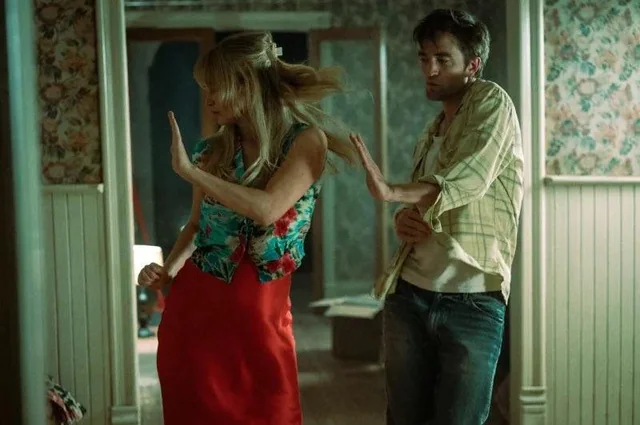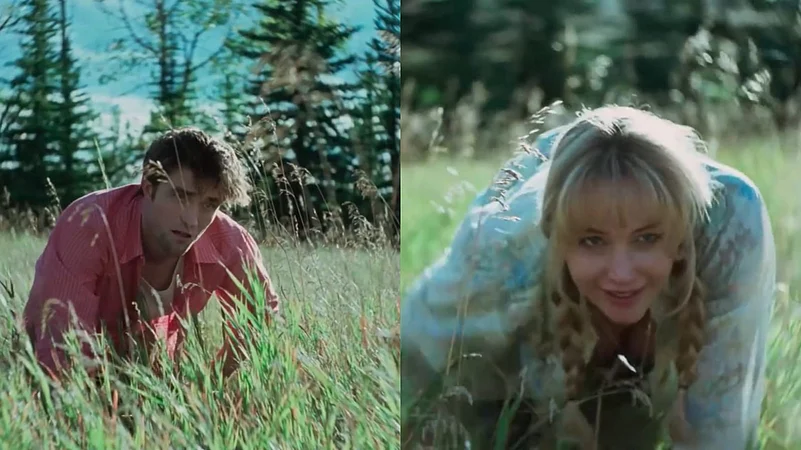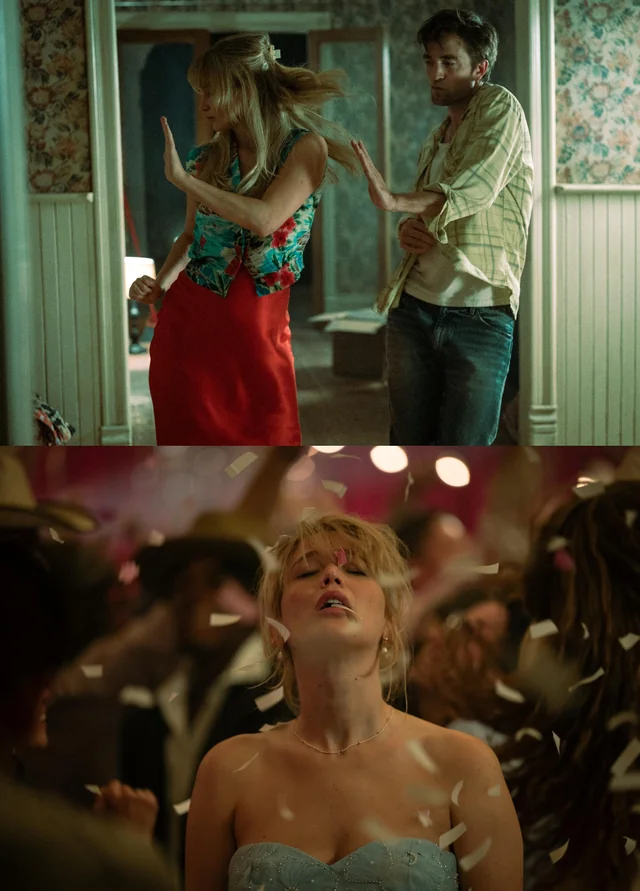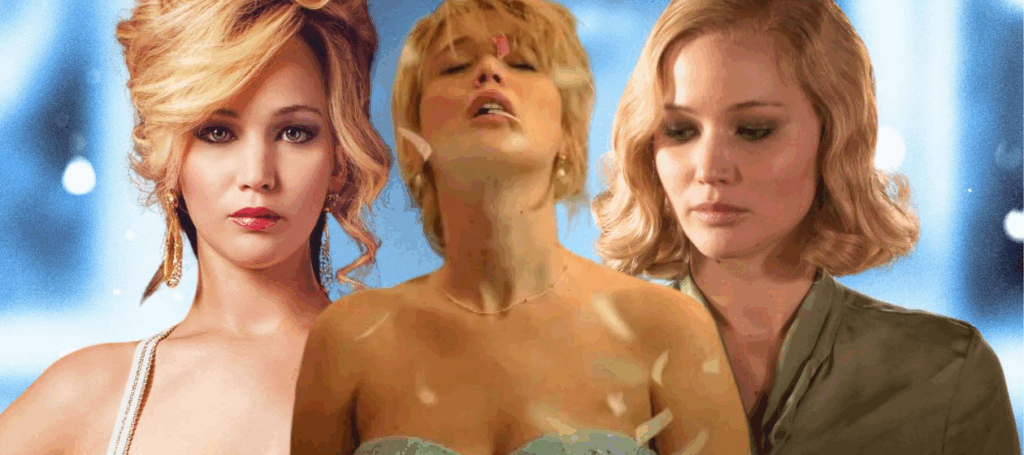Die, My Love

Introducing Die, My Love (2025): A Raw and Mesmerizing Portrait of Madness and Love
Die, My Love (2025) is a psychological dark comedy-drama directed by acclaimed Scottish filmmaker Lynne Ramsay, known for her unflinching explorations of human psyche in films like We Need to Talk About Kevin and You Were Never Really Here. Adapted from Ariana Harwicz’s 2017 novel of the same name, the film premiered at the 2025 Cannes Film Festival on May 17, earning a nine-minute standing ovation and widespread praise for its visceral intensity and Jennifer Lawrence’s fearless performance. Starring Lawrence, Robert Pattinson, LaKeith Stanfield, Sissy Spacek, and Nick Nolte, Die, My Love is a brutal yet beautiful exploration of postpartum depression, love, and mental disintegration set against the stark backdrop of rural America. This article provides a comprehensive introduction to the film, delving into its plot, themes, performances, production, and cultural significance.

Plot Summary
Set in a remote Montana farmhouse, Die, My Love follows Grace (Jennifer Lawrence), a writer who relocates from New York City to the countryside with her musician husband, Jackson (Robert Pattinson), after the birth of their son. What begins as a seemingly idyllic fresh start unravels into a harrowing portrait of Grace’s mental collapse, fueled by postpartum depression and possibly deeper psychological issues. As the pressures of motherhood, isolation, and a strained marriage consume her, Grace’s reality blurs with fantasy, leading to erratic and destructive behavior—crawling through fields, clutching a kitchen knife, or obsessing over a mysterious motorcyclist (LaKeith Stanfield) who may or may not be real.
Jackson, devoted yet helpless, watches Grace spiral, while his mother, Pam (Sissy Spacek), grieving her late husband (Nick Nolte, seen in flashbacks), senses Grace’s distress but struggles to intervene. The film’s nonlinear narrative, punctuated by dreamlike sequences and jarring edits, mirrors Grace’s fractured mind, keeping audiences off-balance. Moments of tenderness, like Grace and Jackson singing David Bowie’s “Kooks” in the car, contrast with shocking outbursts, including a scene critics have called “genuinely disturbing.” As Grace’s psychosis deepens, the film explores whether love can endure amidst madness, culminating in a fiery, ambiguous climax that leaves viewers questioning what is real and what is not.

Themes and Symbolism
Die, My Love is a multifaceted exploration of mental health, particularly postpartum depression, a topic rarely depicted with such raw intensity in cinema. The film delves into the overwhelming isolation and sensory overload of motherhood, with Grace’s domestic life—marked by a crying baby, a barking dog, and a skipping record player—becoming an emotional prison. Lynne Ramsay’s use of sound design and disorienting visuals amplifies this, making the audience feel Grace’s descent into chaos. The film also examines the complexities of love, portraying Grace and Jackson’s relationship as both passionate and destructive, with their “animalistic” connection underscored by primal imagery and volatile interactions.
Symbolically, the rural setting represents both freedom and entrapment, with the vast meadows and forests contrasting the claustrophobic farmhouse. The motorcyclist, possibly a figment of Grace’s imagination, symbolizes her yearning for escape or forbidden desire, while Pam’s sleepwalking with a rifle hints at inherited trauma and grief. The film’s use of music, including Joy Division’s “Love Will Tear Us Apart” sung by Ramsay herself over the credits, reinforces the theme of love as both salvation and torment. Critics have noted parallels to Roman Polanski’s Repulsion and Ramsay’s own We Need to Talk About Kevin, but Die, My Love carves its own path as a “postpartum phantasmagoria” that blends dark comedy, thriller elements, and psychological drama.

Cast and Performances
Jennifer Lawrence delivers what critics have called her most fearless performance since Mother! (2017), embodying Grace with a raw, untamed energy that swings between vulnerability, rage, and dark humor. Her ability to convey Grace’s unraveling—whether crawling on all fours or trashing a bathroom—has been hailed as Oscar-worthy, with Deadline noting it “could mean a fifth Oscar nomination.” Lawrence, a mother herself, brings authenticity to the role, drawing on her experiences to depict the “brutal and incredible” nature of parenthood.
Robert Pattinson complements Lawrence as Jackson, portraying a man whose devotion is both noble and tragic. His understated performance captures the helplessness of watching a loved one deteriorate, earning praise for its “vanity-free gusto.” LaKeith Stanfield’s enigmatic motorcyclist adds an unsettling layer, blurring the line between reality and Grace’s psyche. Sissy Spacek, asPam, brings quiet gravitas, while Nick Nolte’s brief role as her late husband adds emotional weight to the family’s grief. The ensemble’s chemistry, particularly between Lawrence and Pattinson, grounds the film’s surreal tone, making its emotional stakes palpable.

Direction and Cinematography
Lynne Ramsay, a Cannes veteran with films like Ratcatcher and You Were Never Really Here, directs Die, My Love with her signature visceral style. Her screenplay, co-written with Enda Walsh and Alice Birch, adapts Harwicz’s novel while relocating it from France to Montana, amplifying the American Gothic atmosphere. Ramsay’s direction is unrelenting, using jarring edits, unnerving sound design, and a disorienting soundtrack to immerse viewers in Grace’s fractured reality. The film’s 1.33:1 aspect ratio and Seamus McGarvey’s cinematography create a claustrophobic yet vivid visual palette, with lush meadows juxtaposed against the decaying farmhouse.
Ramsay’s use of music—Lou Reed, David Bowie, and even The Chipmunks—adds an eclectic, sometimes ironic layer, with the skipping record player symbolizing Grace’s mental loops. The “missing reel” effect, a nod to grindhouse cinema, enhances the film’s disorienting narrative. While some critics, like Variety, argue the film prioritizes mood over plot, others praise Ramsay’s ability to “shake the audience by the shoulders,” demanding they feel Grace’s turmoil.

Production and Development
Die, My Love began when Martin Scorsese, a fan of Harwicz’s novel, sent it to Jennifer Lawrence’s production company, Excellent Cadaver, in 2020, envisioning her as Grace. Lawrence, drawn to the project, recruited Ramsay, who co-wrote the script with Walsh and Birch. Filming took place in Calgary, Alberta, standing in for Montana, with production wrapping in late 2024. Produced by Excellent Cadaver, Black Label Media, and Scorsese’s Sikelia Productions, the film was financed by Black Label Media and acquired by MUBI for $24 million for North America and multiple international territories, ensuring a theatrical release on 1,500 screens. The rushed post-production to meet Cannes’ deadline may explain some narrative fragmentation, but the film’s raw power remains undeniable.
Reception and Legacy
Premiering at Cannes 2025, Die, My Love received a nine-minute ovation and polarized reviews. Critics lauded Lawrence’s “mesmerizing” and “astonishing” performance, with Deadline and Vanity Fair predicting Oscar contention. Ramsay’s direction was praised for its “incendiary” vision, though some, like Variety, criticized the film as a “showy mess” that wallows in dysfunction rather than exploring it. The BBC called it a “surreal, intense, and sometimes darkly hilarious” mood piece, while Screen International hailed its “unnerving rhythms.” On X, fans and critics described it as a “nightmarish fever dream” and a “devastatingly beautiful meditation on madness,” though some noted its exhausting repetition.
The film’s focus on postpartum depression has sparked conversation, with Lawrence’s comments at Cannes about motherhood’s impact resonating widely. Its dark comedy elements, described by Ramsay as “my kind of comedy and love story, so it’s going to be dark and fucked-up,” add a unique flavor, making it a standout in her filmography. MUBI’s acquisition signals strong awards potential, particularly for Lawrence and Ramsay, and its arthouse appeal positions it as a high-profile release.

Cultural Impact
Die, My Love joins a wave of films tackling motherhood’s challenges, like Nightbitch and If I Had Legs I’d Kick You, but its unflinching portrayal of postpartum depression sets it apart. Lawrence’s performance, likened to her work in Mother!, reinforces her status as a versatile actress willing to take risks. The film’s exploration of mental health, love, and isolation resonates in a post-pandemic world, while its Cannes reception underscores Ramsay’s reputation as a bold auteur. On X, fans have hailed it as “perfect for anyone who thought Mother! was too restrained,” reflecting its cult potential.
The film’s soundtrack, blending punk-rock angst with tender ballads, and its provocative imagery, like Grace’s feral outbursts, are likely to inspire memes, fan art, and academic analysis. Its acquisition by MUBI suggests a robust streaming and theatrical presence, potentially broadening its reach beyond festival audiences.

Why Watch Die, My Love?
Die, My Love is not an easy watch—it’s a raw, unsettling journey into the mind of a woman on the edge, anchored by Jennifer Lawrence’s tour-de-force performance and Lynne Ramsay’s visionary direction. It’s a film for those who appreciate bold, challenging cinema that doesn’t shy away from discomfort. Fans of Ramsay’s previous work, psychological dramas, or dark comedies will find much to admire, as will those drawn to stories about love’s complexities and mental health’s toll. While its fragmented narrative may exhaust some, its emotional intensity and haunting beauty make it unforgettable.
As Die, My Love prepares for its 2025 release, it stands as a testament to the power of cinema to confront difficult truths with artistry and heart. Whether you’re captivated by Lawrence’s ferocity, Pattinson’s pathos, or Ramsay’s audacious style, this film demands to be experienced. Prepare to be shaken, moved, and perhaps even transformed by this brutal symphony of love and madness.
